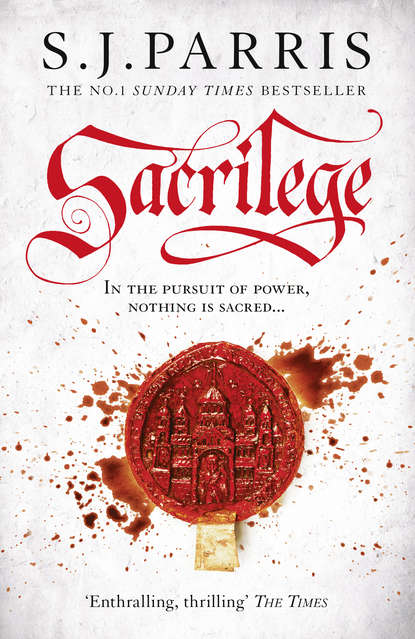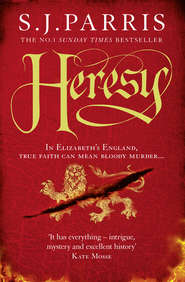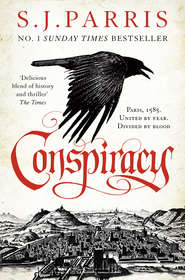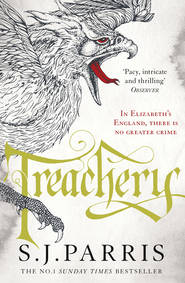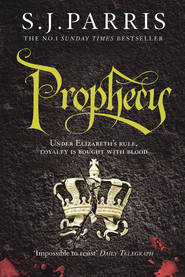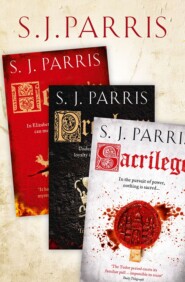По всем вопросам обращайтесь на: info@litportal.ru
(©) 2003-2024.
✖
Sacrilege
Автор
Год написания книги
2019
Настройки чтения
Размер шрифта
Высота строк
Поля
A mile or so outside the walls of Canterbury we stopped in the village of Harbledown to let the horses drink. It was a pretty enough place, surrounded by orchards, no more than a few houses straggling along a single street which rose steeply towards the city in the distance. We led the horses off the road by an old almshouse and found a spot in the shade to sit down and prepare ourselves for the riskiest part of our journey. My head ached and my throat was gritty with dust, despite the kerchief.
‘If the plague fears have reached Canterbury, we may find them more vigilant than usual at the gates,’ I said, passing Sophia a leather bottle of small beer, warm now from hanging by my side along the road, but better than nothing. ‘Though the fact that everyone has a cloth tied around their face ought to work to our advantage. If they stop us, just keep your eyes down, your cap low over your face, and your mouth shut. We can pretend you are a mute. You shouldn’t find that too hard,’ I couldn’t help adding, at the sight of her sullen expression.
She reached for the bottle, held my gaze for a long moment, enough to be sure that I knew she was still angry with me, then took a swig and looked pointedly away, squinting into the sun above the trees. For the best part of an hour she had refused to speak, ever since I had broken the news to her that morning that she would not be able to stay with me in Canterbury and would need to presume again on the hospitality of her Huguenot friends. I had expected her to be displeased by the idea, knowing she would fear for their safety, but I had not anticipated the flash of fury it provoked. She had railed at me, accusing me of reneging on my promise to help her, until I pointed out sharply that we were not the only travellers on the road and that shrieking like a girl-child was the best way to give herself up before we even reached the gates. She had fallen silent after that and remained so, with the occasional simmering glance from beneath her cap, until we stopped.
Now she propped herself up on one elbow and regarded me dispassionately before offering me the bottle. I took a brief sip and winced; my stomach had been feeling queasy since I first awoke and the heat of the day was not improving the symptoms.
‘What if the French houses have been searched, looking for me?’ Sophia said. ‘Someone will have told the constables that I was friends with Olivier, I am sure of it.’
‘Then you should be all the safer. You have been gone from Canterbury more than a fortnight; if the authorities have already searched the city, they will not expect you to return.’
‘I still don’t see why I can’t come with you, if I am supposed to be your servant.’ She tore up a clump of grass with some force, then flung it away as if she found it offensive.
‘Because innkeepers, and especially their wives, are the most professionally inquisitive people in all creation,’ I said impatiently. ‘Their whole business is to observe and speculate on the travellers who come through their doors. We’ve been lucky so far, but any more than one night in the same hostel and someone will deduce right away that Kit is not what he claims to be. No.’ I shook my head. ‘Lie low with the Huguenots. I will be enough of a curiosity on my own.’ I rubbed a hand across my chin; four days’ growth of dark beard only reinforced the foreignness of my appearance, especially now that the sun had tanned my face to a colour it had not been since I was a boy running free all day on the slopes of Monte Cicada. My hair, too, had been neglected over the past weeks when I was preoccupied with finishing my book; I could not remember the last time I paid a visit to the barber, and it had grown so that it fell across my eyes at the front and curled over my collar at the back. ‘One of my first tasks once we are inside the city gates must be to get a shave and a haircut,’ I complained, pushing my fringe back from my face.
‘You look better with no beard,’ she remarked, her voice brighter. ‘Younger, I mean. It suits you.’
I glanced up, surprised, but she remained preoccupied with plucking blades of grass and scattering them around her and did not look at me. I was reminded again of how little I understood a woman like Sophia. I hardly considered myself an expert on the ways of women, but it had been eight years since I cast off my Dominican habit and with it my vows, and at the court of Paris I was given ample opportunity to observe the flirting and simpering of fashionable ladies at close quarters. Sophia had learned none of these wiles, yet her artless frankness was far more disarming; she could offer a compliment as casually as remarking on the weather and every time, like a fool, I allowed it to quicken a little spark of hope.
‘It’s a pity we can’t get you a beard somehow,’ I said, after a moment’s silence, watching how the shadow of the leaves fell across her smooth cheek. ‘It would help your concealment no end.’
‘My aunt had the beginnings of one,’ she said, looking up with an unexpected grin. ‘She was forever trying to pluck hairs from her chin. I suppose we can’t wait for me to reach her age.’
‘If we don’t make your disguise convincing, you won’t live to reach her age,’ I said, and immediately regretted it; her smile vanished on the instant and her eyes clouded again. She returned to pulling up the grass with renewed force.
‘Are you afraid?’ I said.
She looked directly at me then and held my gaze in those expressionless, honey-coloured eyes.
‘Canterbury is a small city, as you’ll see. Now that we are so close to its walls, I wonder what I was thinking, coming back.’ She passed a hand across her brow and sank on to her elbows. ‘But this place has never been anything other than a prison to me since I was first brought through its gates. I don’t suppose a real prison would be all that different.’
The careless note in her voice was betrayed by the tightness around her mouth, the way she pressed her lips into a white line. I remembered her silent tears in Faversham. She was afraid, but she was damned if she was going to let me see it. I glanced up at the sky, where a single skein of pale cloud interrupted the eggshell blue.
‘Well, then,’ I said, levering myself to my feet. ‘Into the lion’s den.’
The vast circular towers of the city’s West Gate loomed up ahead of us on the road, solid and forbidding in dark, flint-studded stone, set in the thick walls like the entrance to a fortress and visible from some distance away. To either side the road was lined with modest buildings of wood and plaster. We crossed a little stone bridge over a rivulet just before the gate and as we followed the road into the cool shadow of its great central archway I felt my skin rise in gooseflesh and my bowels clench. Now that we were on the threshold, I acknowledged the truth in Sophia’s words; if we should be stopped here, I had as good as led her to her death in my eagerness to save her. A foreigner and a fugitive; what chance did we have of passing unnoticed in a small English city with an entrenched suspicion of outsiders? I glanced across at Sophia, but could see little of her face between the peak of her cap and the cloth she pulled up tighter over her nose. I did likewise, and nudged the horse onward under the gate.
But the guard at the gate gave only a cursory glance to my travel licence before waving us through; his main concern seemed to be keeping the flow of traffic moving, though I felt every muscle tense with the expectation of a hand on the reins at any moment. The greatest impediment to our free movement came from the jostling vegetable carts and the press of people carrying baskets and bundles in both directions through the gate, most of whom, I noticed, also had cloths tied around their faces. Perhaps the citizens of Canterbury were less alarmist about the plague rumours, or perhaps the necessity of making a living prevented them from being too picky about incomers. A trickle of sweat ran down my open collar and I tugged it away from my skin with one finger, my eyes still roving the street for any sign of danger.
We found ourselves at the end of a thoroughfare that ran between lines of two- and three-storey houses in the English style, of white plaster and dark timber frames, each upper storey overhanging the one below, so that it seemed the buildings were leaning inwards in order to share some gossip with those opposite. On both sides the ground floors of these buildings had their shutters up and their windows employed as street-counters from which to sell their wares; we passed chandlers, ironmongers, drapers, shoe-makers and apothecaries, each shop with its own distinctive smell, all clamouring for the attention of passers-by. Barefoot children chased one another, laughing, through the crowds, dodging the mounds of horse dung and refuse and amusing themselves by throwing odd vegetables that had fallen from the carts at stray dogs. Washing had been hung to dry from the windows of the upper storeys, though the closeness of the buildings kept the street shaded. On every corner the painted signs of inns or taverns creaked above doorways, a reminder of the days when Canterbury had played host to travelling pilgrims in their thousands, though many of the hostelries appeared run-down and neglected now, their plaster cracked and paint forlornly blistered. Outside them, old men lolled on wooden benches, jugs of beer in their hands, fanning themselves and watching the life of the street. Passing too close to strangers, I caught the smell of sour sweat. I craned my head back; above the line of crooked rooftops to my left rose the bell tower of the famous cathedral, standing sentinel over the city.
‘Turn left,’ a voice behind me growled. I turned sharply, and saw Sophia motioning to me with her eyes. ‘Left here,’ she said again, this gruffness apparently an attempt at sounding masculine.
I almost laughed, but did my best to swallow it and urged the horse to the side of the street down a narrow alleyway between houses. Towards the far end of this lane the dwellings grew smaller and poorer, but along the right-hand side where the lane bordered the river stood a row of compact three-storey houses joined together. Their frontage was neat and clean, the steps by the front doors swept free of refuse and to each side of the door earthenware pots brimmed with red flowers. I rode as far as I could go, until the lane petered out in a cluster of shabby cottages. Here I turned the horse in a tight circle and looked expectantly at Sophia.
‘The white houses near the road – those are the weavers’ houses,’ she hissed. ‘The middle door. Ask for Olivier Fleury.’
I nodded briskly, dismounted and handed her my horse’s reins. The little street was empty, but I glanced around uneasily, imagining curious eyes behind the glass of every window. Surely it was not unusual for the French weavers to receive visitors, I told myself; I must shake off this conviction that everyone regarded us as suspicious or I would cause them to do so by my behaviour.
Stiffly I approached the low doorway of the middle house and knocked, pulling the cloth down from my face with the other hand as I did so. Through the open windows I could hear sounds of industry: the rhythmic clicking of wood against wood, a clanking of metal, the odd muted voice, sharp, as if giving instruction or calling out some demand. A hot, heavy smell drifted out; steam and wet wool and some other ingredient I could not identify. I knocked again and eventually the door was opened and I jumped back in surprise.
A tall, wiry youth, barely into his twenties, stood in the doorway, his shirtsleeves rolled to the elbow. He looked at me, suspicion in his eyes. There was a faint hint of arrogance in his expression that sowed a seed of dislike in me. Nonetheless, I smiled graciously.
‘Olivier Fleury?’
‘Who wants him?’
He spoke in French, so I replied in kind.
‘An old friend.’
He considered me for a moment.
‘I have never seen you before, monsieur.’
He possessed that combination of sullen carelessness and self-regard that I had observed often among the French courtiers, though it seemed misplaced in the son of émigré weavers. But if I was honest, I found myself disliking this Olivier because, despite his sulky expression, he was undeniably handsome. His dark brown hair was cropped short and his skin was tanned, making his blue eyes appear all the more vivid. He had a manner of looking at you from under hooded lids with his head tilted back that implied disdain, and his full lips were set in a permanent pout. I could see how a young woman of twenty, trapped in a cruel marriage, might choose to seek solace in the company of a sympathetic youth with a face like this. Though I was unsure of the details of their friendship, I wished I did not have to deliver Sophia directly into his home, and fleetingly considered the possibility of taking her to stay with me at the inn instead. Reluctantly, I was obliged to concede that her safety was more important than my jealousy.
‘The friend I speak of is a young man of your acquaintance recently returned from London, on personal business.’ I gave him a meaningful look; his blue eyes registered first confusion, then slowly widened in disbelief as he leaned forward on the step, bunching his apron in his fist, his gaze anxiously searching the street to left and right. I nodded to my left; he pulled the door to behind him and followed me around the bend in the lane to where Sophia sat, still mounted, holding my horse by his reins.
If there had been some connection deeper than friendship between them, however, their initial response gave no indication of it. Olivier stared up at the ragged figure on the horse, her face barely visible between the cloth mask and the cap, then took a step backwards with a minute shake of his head, as if trying to deny to himself the evidence of his own eyes. Sophia merely returned his look, her eyes glints of light in the shadow that obscured her expression. Olivier’s frown of confusion hardened into anger as she slid awkwardly from the saddle and led her horse and mine a few paces towards us.
‘Why is she here?’ Olivier hissed through bared teeth, turning to me with a flash of fury. ‘This is madness.’
‘There was no choice,’ I began, but it was clear he wasn’t listening. He seemed genuinely afraid as he fixed his eyes again on Sophia.
‘Olivier,’ Sophia whispered, stepping closer. ‘This is my friend Bruno. He is going to find my husband’s killer and clear my name. But I had to come back to help him.’
She raised her eyebrows and nodded earnestly, as if this might persuade him. Olivier pushed both hands through his hair. He puffed out his cheeks and exhaled slowly, still staring at her as if she were insane.
‘Who else knows you are here?’ he asked her, in English.
‘We have only just this moment ridden through the city gate,’ I offered.
He shook his head again and glanced quickly up the lane.
‘Get inside the house, then, before anyone sees you. This will kill my mother, you know,’ he added in French, turning his scowl on me, as if it were all my fault.
‘I am sorry for any distress to your family,’ I said, feeling that to placate him would aid us best. ‘But she would not be safe anywhere else.’
‘She would be safe in London,’ he hissed back. ‘That was the whole point.’
‘Better you don’t fight about it in the street,’ Sophia murmured, with remarkable calm, handing me the halters of both horses as she slipped past Olivier into the doorway of his house. He glared at me again.
‘For one night, then. But we will speak further.’
‘I would be glad to, if you tell me where to find you,’ I said, still trying to deflect his anger with civility. I could understand how disconcerted he must feel, having thought he was free of any danger from his association with Sophia; to conceal a fugitive criminal was, as I understood the English law, itself a hanging offence. For a refugee family who had already escaped religious persecution, sought a quiet life and risked their good name once out of kindness, being expected to repeat that same sacrifice might seem an excessive test of their faith. If I had been gratified at first to see that neither Sophia nor Olivier showed any obvious pleasure at being reunited, such sentiments were quickly supplanted by a sense of shame at my own triviality.
‘Come back tomorrow morning,’ he muttered, darting another nervous glance over my shoulder, towards the end of the lane and the main street beyond. ‘My family and I will decide what to do by then.’





